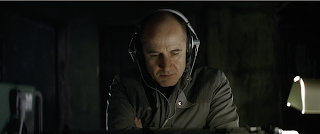On Wednesday 2 March at 18:01, the Phnom Penh Film Club stretches out for the ambitious, riveting, astonishingly perfect cold-war suspense thriller, *The Lives of Others* (2006), directed by Florian Henckel Von Donnersmarck.
To say that this is a film about a power-intoxicated love triangle behind the iron curtain barely hints at the subtle complexity of this enthralling story about the men of the dreaded "Stasi," the East German secret police -- and about the 'lives' of all those 'others' they were tasked with monitoring. It is this, of course, but it is so very, very, *very* much more.
It is East Berlin in 1984 and, as the opening placard explains, "Glasnost is nowhere in sight." Deep in the shadowy clockwork of the Stasi lurks rising-star Gerd Weisler (Ulrich Muehe), cool-headed interrogator extraordinaire to whom we are introduced at the very apotheosis of his chilling craft: The two opening scenes are intercut between his deadpan interrogation of a suspect, and his explication of best practices to a classroom full of college students. At the conclusion of the class, Weisler's friend and superior Anton Grubitz (Ulrich Tukur) invites him to see the work of "the republic's only non-subversive artist," Georg Dryeman (Sebastian Koch), writer-director of a play to be premiered that very evening. For reasons of his own, Grubitz anticipates that the show will be attended by his own superior, Culture Minister Bruno Hempf (Thomas Thieme), and doesn't want to be seen there without company.
At the play Grubitz takes turns congratulating himself to Weisler for his good judgment about Dryeman's self-evident loyalty, and panning back down to the VIP seats to watch Hempf -- who seems restless and fidgety during the performance, except when the stage is held by the leading actress, Dreyman's girlfriend Christa-Maria Seiland (Martina Gedeck). Weisler, meanwhile, is content to stare-down Dreyman himself, waiting for even the slightest hint of odd behavior. "I'd have him monitored," Weisler says to Grubitz in an affectless monotone as the play is ending.
Of course he has no idea what he's letting himself in for, or how the granting of his wish to install a listening station in the attic above Dreyman's apartment will change the lives of all the aforementioned parties, forever. By the time it's all over, this improbably complex and subtle narrative will manage to shift our sympathies for the main characters not once but several times -- even without the benefit of knowing, until the end, exactly what's been going on.
The skill with which this film patiently assembles its intricately woven characters, the subtle changes in perspective and allegiances, the quiet desperation, the blind alleys of possible twist-of-plot that must come to nothing if we are to find the eventual resolution genuinely surprising, are unto themselves a thorough justification for this film's placement in the pantheon of genuinely superlative motion pictures. But beyond the "simple" fact of the tight formation in which all these disparate plot elements must fly, there is the added consideration that each of the other cinematic ingredients under Donnersmarck's control are surmounted with equally unforced aplomb: from the subtle use of color schemes to convey different characters' visions of their situation and its terrifyingly fluid nature, to the brilliant deployment of Gabriel Yared's versatile and haunting soundtrack, to the unlikely authenticity of the listening equipment with which Weisler is shown, up in that attic, finding out so much more than he bargained for about the people on whom he has volunteered to spy.
Acclaim for this marvel was instant and worldwide. At the Deutsche Filmpreis -- Germany's Oscars -- The Lives of Others smashed all previous records by garnering eleven (!!!) nominations, eventually taking seven of those awards: Best Picture, Best Director, Best Screenplay, Best Actor, Best Supporting Actor, Best Original Score and Best Production Design. All three of the BAFTA Awards, The Academy, and The Golden Globes recognized it as the Best Foreign-Language Film, and it was named as one of the overall ten-best films of 2007 by critics from Austin to Baltimore, from Moscow to the New York Times. In 2011 the venerable Europe List recognized The Lives of Others as one of The Top Three Films of European Culture, together with Benigni's *Life is Beautiful* and Jeunet's *Amelie*. Shot and finished for barely $2 Million USD, the film had earned over $77 Million by the end of its first full year in print.
I sincerely urge everyone who has supported the club in any capacity and to any degree to seriously consider attending our 02-March screening of this literal masterpiece at our new start time of 18:01. There are thrillingly entertaining movies on our calendar, and deeply affecting movies, and movies exquisitely made, and there are critically important movies on our radar, too. But very few of our selections are so much of all these things at once.





No comments:
Post a Comment